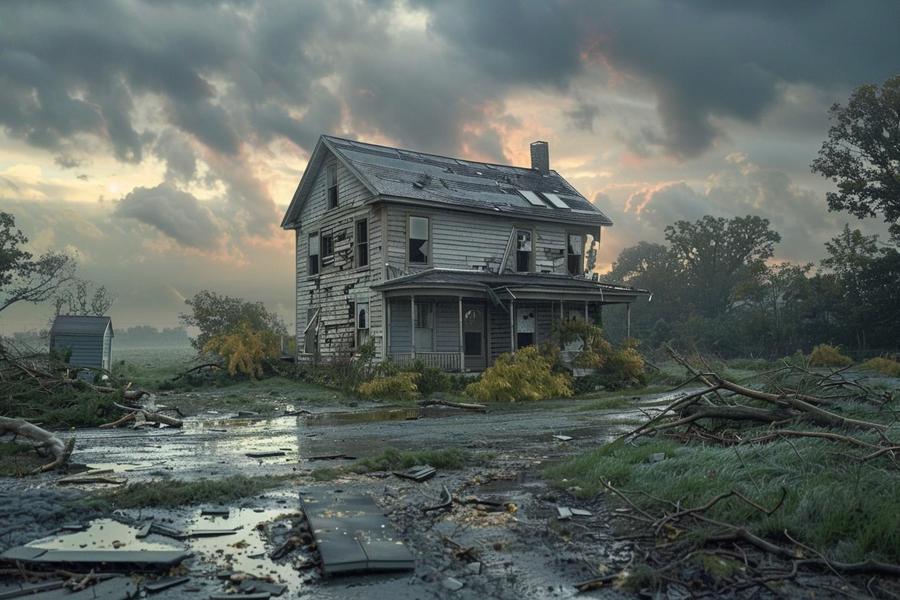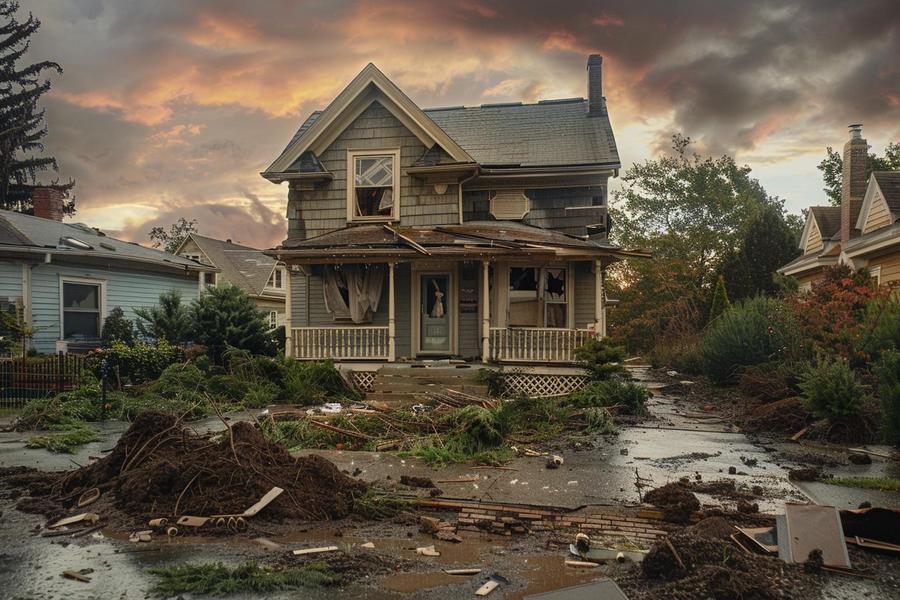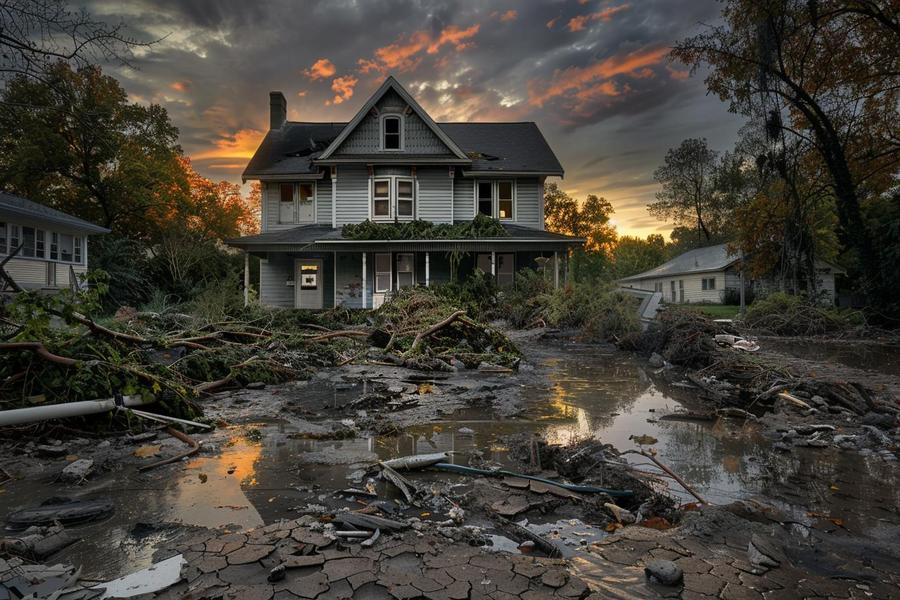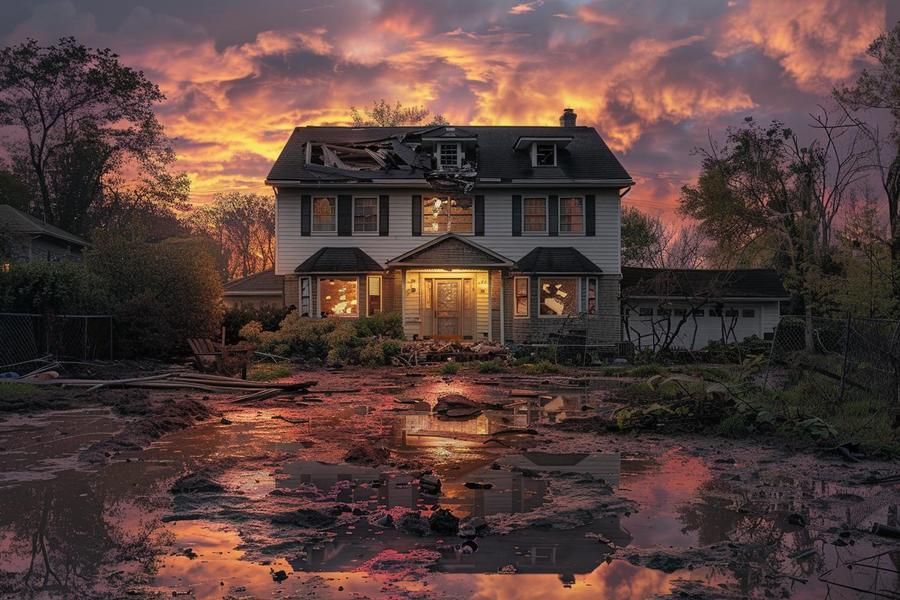Storms can hit hard, leaving your house with damage. You might think selling it now is tough. But don't worry! Whether it's a leaky roof or broken windows, I'll show you how to handle it. First, let's figure out what damage you've got. Then, we'll talk about if it changes your house's value, dealing with insurance, and if you can still sell. Selling a storm-damaged house might seem big, but I'll guide you through. Ready? Let's dive in.
TL;DR:
- Storm damage can significantly lower a home's value, affecting both structural integrity and cosmetic appeal.
- Insurance often covers storm damage but claiming can be complicated; understanding your policy and seeking professional advice is crucial.
- Selling options include as-is to cash buyers or through a real estate agent, with the decision heavily influenced by the extent of damage and repair costs.
- Home inspection before selling is advised to assess and possibly repair damage, enhancing value.
- Full disclosure of storm damage to potential buyers is legally required in many states and builds trust.
- Final sale strategy should weigh the specifics of damage, potential repair costs, the current market, and personal circumstances.

Common Home Damages Caused by Storms
What Types of Damage Can Storms Cause to Your Home?
Storms can wreck your home in many ways. They often rip off roof shingles, break windows, and bend siding. Gutter systems also take a hit. These damages lessen your home's look and safety.
How Can Homeowners Assess Their Storm Damage?
To check storm damage, start with the roof as it's most exposed. Look for missing shingles or leaks. Review your siding for cracks or splits. Check gutters for breaks or blocks. Windows and doors should get checked for cracks and frame damage. Assessing storm damage here helps grasp how wood elements warp post-storm.
When your home faces storm hits, address roof issues first. The costs can vary big time, from small fixes to full replacements. It's key to know the full extent to prevent future hassles like leaks.
For siding, wounds might look minor but can shield bigger frame issues. This makes a thorough inspection crucial. Also, ensuring your gutters are clear helps avoid water damage to your foundation.
Windows and doors act as shields to your home. Any weak spots can invite more damage, making them urgent to fix.
In all cases, if the repairs tower over your home's value, selling might be the smart move. Potential buyers often include cash buyers and investors. They usually buy homes as-is, saving you the burden of repair. This market insight should guide your decision to either fix up or sell as damaged. Remember, selling a storm-hit home can be slow, as buyers tread carefully around such properties.
Does Storm Damage Devalue a House?
How Does Structural and Cosmetic Damage Affect Your Home’s Value?
Storm damage can lower your home's price. Damage to key areas like roofs can scare away buyers. Even small fixes might cost much. This makes it hard to keep the house's value up.
Can Storm Damage Severely Impact Resale Value?
Yes, serious storm damage can drop your home's resale value. Big issues mean big repair costs. Most buyers won't want to bear that cost. So, you might need to lower your price or sell as-is to close a sale.
Damage isn't just about looks. A broken roof can cause more trouble. Water might leak in and ruin walls or floors. If you don't fix it, the problem grows and costs more later. Before selling, check what repairs can help maintain your home’s value and consider having a comparative market analysis done.
Selling a home with storm damage is a big decision. It helps to know your options. You can fix it up or maybe sell as-is. Remember, some damage might be too costly to fix before selling. Consider all possibilities when deciding.
Related Links:

Does Insurance Compensate for Storm Damage?
Navigating Insurance Claims for Storm Damage
Yes, insurance often covers storm damage. Many home insurance policies include cover for harm from wind, rain, or hail. Yet, getting the money can be tough. Time and details matter a lot here.
You must check your policy after a storm hits. It tells what damage it covers and how much it will help. Make sure to report the damage as soon as it happens. Take photos, keep repair bills, and write down how the damage affects your home. This evidence helps when talking to the insurance company.
An insurance adjuster will visit to assess the damage. They decide how much the insurance should pay. Sometimes, this amount might not match the repair costs. Here, you can talk it over or get a second opinion.
If the claim is accepted, the insurance company may give you two payments. One for starting repairs, and another after the repairs are done. If the claim gets denied, you can appeal the decision.
At times, even with insurance, costs can exceed what you receive. This might make selling a tough choice.
Selling a House with an Open Insurance Claim: What to Know
Selling a home with an ongoing claim adds extra steps. You must tell any buyer about the claim and the damage. The buyer might wait until the claim ends or might take over the claim.
When you have a house hit by a storm, knowing how insurance helps is vital. It guides whether to fix the home or sell as is. Always study your insurance terms and promptly file claims post-storm to maximize your coverage benefit. Talking to a professional can also ease the process. Check out this Forbes article on storm damage insurance claims for a detailed understanding of how to handle these situations efficiently.
Can You Sell a Storm Damaged Home?
Exploring Your Options for Selling a Storm-Damaged House
Yes, you can sell a storm-damaged home. Cash buyers and investors often buy these homes quickly. They do not need repairs before purchase. This is a good path if the damage is big and fixing it costs more than what the home might sell for.
Options include selling "as is" to a cash buyer or using a real estate agent. This choice often depends on how quickly you need to sell and your home's location. If time is short, cash buyers might be the best bet.
The Pros and Cons of Selling a House As-Is With Storm Damage
Selling a house as-is means you sell it in its current state. This can be easier but you might get less money for your home. Buyers often expect lower prices for homes that need work.
On the plus side, you avoid the cost and time of fixing the home. Yet, the price drop might be greater than the repair costs would have been. It's wise to compare these costs before deciding.
In areas like Miami or New Orleans, where storms are common, buyers might be more open to buying storm-damaged homes. Yet, selling might take longer than in places less affected by storms. Always think about your local market when deciding how to sell your storm-damaged home.

What to Do Before Selling a Storm Damaged Home
Should You Get a Home Inspection Before Selling?
Yes, you should. A pre-sale home inspection is wise to evaluate damage. It pinpoints what repairs are necessary before listing. Inspectors check your home top to bottom. They highlight issues like roof and siding damage. This helps you and buyers know the home's condition. Read more about the benefits of a home inspection before selling.
To Repair or Not to Repair: Making the Right Choice
Deciding to fix problems depends on cost versus benefit. Small fixes can boost home value. Yet, large issues like deep roof damage or broken frames might not pay off. It's vital to assess if repairs will increase your sale price. If not, selling 'as-is' might suit better. This saves you upfront costs.
In short, you must inspect your home, weigh repair costs, and set a fair price. This smooths your sale process, from start to finish.
Options When Selling a Damaged House
Selling to Cash Buyers: A Quick Resolution
If you need to sell a storm-damaged house fast, cash buyers are your best bet. Cash buyers often look for properties they can fix and flip. They will buy your house as is. This means you don't need to fix the damage first. In cities like Miami, Houston, and New Orleans, where storms hit hard, cash buyers are very active.
However, selling to cash buyers means you might get less money. They take on big risks and costs to repair the house. You trade a higher sale price for a quick and sure deal. This option works well if the repair costs bust your wallet, or if you must sell fast.
Working With a Real Estate Agent: The Traditional Route
Finding a real estate agent who knows about selling storm-damaged homes helps a lot. These experts know how to deal with such unique cases. They help price your home right, even with the damage. They also connect you with buyers who want a fixer-upper or who can see beyond the flaws.
An agent will list your house on the market. This might take longer but could fetch a better price than sale to cash buyers. Agents know how to show the potential of a house, even if it has issues like damaged roofs or broken windows. If you're not in a rush and can afford to wait for the right buyer, this might be the route for you.
Both options—selling to cash buyers or using an agent—offer solutions, depending on your needs and situation. Carefully weigh the pros and cons of each to make the best choice for your circumstances. Whether you want speed and convenience or a higher sale price, you have choices to consider.

Disclosing Storm Damage When Selling a House
The Importance of Full Disclosure in Real Estate Sales
Always tell buyers about storm damage when you sell a house. This honesty helps build trust and avoids legal trouble. You must note all the harm, especially to big areas like roofs or walls. Homes in Florida, Texas, and Oklahoma, often hit by storms, may need this more.
Navigating the Legal Landscape of Storm Damage Disclosure
Laws about telling buyers of storm damage vary by place. In some states, you must share details about past damage if it might affect the house's safety or value. It's wise to check with a real estate lawyer to understand local rules. This action ensures you meet all legal needs and protect yourself from future claims.
For instance, if you're selling in New Jersey, state law could require you to reveal any flood damage from hurricanes. Keeping good records of all repairs can also support your disclosures, proving you fixed what was needed and maintained the house well. Remember, full disclosure not only covers your legal bases but also sets a clear, honest tone for the sale, which can attract serious buyers who are ready to deal with the home's condition.
Final Thoughts: Selling a House with Storm Damage
Embracing the Challenge: Key Considerations for Sellers
When your house has storm damage, think first about the damage type. Does it hit hard parts like the roof or walls? Or is it less big, like paint or windows? This impacts your sale process.
If damages are deep, like to the structure, selling as-is to investors could be smart. They often look for such homes. If fixes cost more than what you might get from selling, this path makes sense.
Look at every part, like windows, roofs, and walls. Roof fixes might cost between $800 to $10,000. For a wall, you might pay from $200 to $1,100, based on how bad it is. Hence, knowing all costs is vital before deciding. In some cases, fixing might hold better value for your home.
Having trouble with insurance for these fixes? You're not alone. Many fight to get enough money back to cover all costs after a storm. Get a pro to check your home before you decide to sell or fix. This helps you know what you're dealing with.
As for selling, you have options. You might choose fast cash buyers. Or, maybe going with an agent suits you more. Yet, selling with storm damage can take time. Buyers often step back from homes with recent storm hits.
All these steps are big to think of. But facing them with the right info helps a lot. The aim is to make the best move based on your situation and the market. Always look for full value in whatever path you take.
We covered a lot today, from types of storm damage to selling damaged homes. Remember, storm damage can affect your home's value, but options exist. You can sell as-is, often to cash buyers like Eagle Cash Buyers, or fix up your place. Always check with insurance and be honest about damage when selling. Selling a storm-damaged house might seem tough, but with the right approach, you can do it well.











